描述
內容簡介
觸動心靈的寓言故事
小時候,故事書經常是陪伴我們長大的忠實良伴,在成長的過程中引領著我們。好的故事會觸動心靈,並且啟發我們要讓自己和周遭的世界變得更好。故事,也會形塑我們的價值觀,而我們最終成為什麼樣的人將取決於這些價值觀。
星雲大師著《星雲說喻 中英對照版》一共六冊,讓讀者透過閱讀生動有趣的故事,探索並領悟佛陀深奧的教法和人間佛教理念。故事圍繞著佛教的「六度波羅蜜」開展,也就是菩薩道的「六度」精神:布施、持戒、忍辱、精進、禪定和般若。每篇故事以一則智慧法語作為總結,引導讀者省思個中寓意。這些故事如同一面明鏡,帶著我們檢視生活,思維如何將那永恆不朽的佛法應用在生活。
第四冊收錄十五篇以六度波羅蜜中的「精進」為主題的短篇故事。這是一套適合所有年齡層讀者的故事選集,本套書亦提供中英詞彙表,雙語讀者能更好理解每則故事的精髓。
期許《星雲說喻 中英對照版》能帶領讀者探索故事中無窮的慈悲、智慧與布施精神,照亮生命的道路。
Since our earliest days, stories have been faithful companions, guiding us through life’s journey. The power of a good story lies in its ability to touch our hearts, inspiring us to grow and bring positive change to ourselves and the world around us. Stories shape our perspective, and in turn, our perspective shapes who we become.
Introducing Bodhi Light Tales by Venerable Master Hsing Yun, a monumental 6-volume set available in both English and Chinese. This enchanting collection invites readers to explore the profound teachings of the Buddha and the principles of Humanistic Buddhism. Stories centered around the Six Paramitas, also known as the Six Perfections: Generosity, Precept, Patience, Diligence, Meditative Concentration, and Wisdom. Each tale in this collection is accompanied by words of wisdom, offering profound insights that encourage reflection upon the moral lessons conveyed. These stories provide a mirror through which we can examine our own lives and contemplate how these timeless teachings can be applied to our daily existence.
In this fourth volume, you will immerse yourself in the realm of Diligence through a treasury of 15 short stories. Designed to captivate readers of all ages, this book also includes vocabulary lists to assist bilingual readers in fully understanding the essence of each tale.
May Bodhi Light Tales illuminate your path as you explore the boundless possibilities of compassion, understanding, and generosity.
★中英對照 全彩圖文 故事隨身聽 親子教育最佳教材
作者簡介
星雲大師,江蘇江都人,一九二七年生,十二歲禮志開上人為師,祖庭江蘇宜興大覺寺,傳臨濟正宗第四十八世。一九四七年於焦山佛學院畢業,期間曾參學金山、棲霞等禪淨律學諸大叢林,歷經宗下、教下、律下等完整的佛門教育。後應聘為白塔國小校長,主編《怒濤》月刊。
一九四九年春來臺,主編《人生雜誌》、《今日佛教》、《覺世》等佛教刊物。
一九六七年創建佛光山,樹立「以文化弘揚佛法,以教育培養人才,以慈善福利社會,以共修淨化人心」四大弘法宗旨,以「人間佛教」為宗風,先後在世界各地創建三百餘所道場,創辦多所美術館、圖書館、出版社、書局、人間福報、雲水醫院,興辦佛教學院十六所,中學三所,及西來、南華、佛光、南天、光明五所大學,及人間佛教研究院。
一九七O年後,相繼成立「大慈育幼院」、「仁愛之家」,收容撫育無依之幼童、老人及從事急難救濟等福利社會。一九九一年成立「國際佛光會」,被推為總會會長,實踐「佛光普照三千界,法水長流五大洲」的理想。
一九七七年編纂《佛光大藏經》、《佛光大辭典》,《中國佛教經典寶藏精選白話版》等。二O一七年出版《星雲大師全集》,共三百六十五冊,三千餘萬字,有系統地闡述人間佛教的思想、學說、理論,以及實踐結果。
二O二三年,大師住世緣盡,淨業圓滿,享耆壽九十七,被奉為佛光堂上第一代開山祖師,留遺偈:「心懷度眾慈悲願,身似法海不繫舟, 問我一生何所求,平安幸福照五洲」。
Biography of Venerable Master Hsing Yun
Venerable Master Hsing Yun was born in 1927 in Jiangdu, Jiangsu Province, China. At the age of 12, he was tonsured by Venerable Master Zhikai in Qixia Temple, Nanjing, with Dajue Temple in Yixing, Jiangsu, as his ancestral temple. He later became the 48th-generation lineage holder of the Linji Chan school. In 1947, he graduated from Jiaoshan Buddhist College, and also trained at various Chan, Pure Land, and Vinaya monasteries, including Jinshan, Qixia, and others. He received a comprehensive Buddhist education in the lineage, teachings, and Vinaya disciplines. Later on, the Venerable Master was invited to serve as the principal of Baita Elementary School, and also the editor-in-chief of Raging Billows Monthly.
In the spring of 1949, the Venerable Master arrived in Taiwan. He served as the editor-in-chief of Human Life Magazine, Buddhism Today Magazine, and Awakening the World.
In 1967, the Venerable Master founded the Fo Guang Shan Buddhist Order, with the Four Objectives: to propagate the Dharma through culture; to foster talents through education; to benefit society through charity, and to purify people’s minds through spiritual cultivation. Guided by the principles of Humanistic Buddhism, he went on to establish over three hundred temples worldwide. Additionally, he oversaw the creation of various art galleries, libraries, publishing companies, bookstores, the Merit Times newspaper, and the Cloud and Water Mobile Clinic. Furthermore, he established sixteen Buddhist colleges and founded three high schools and five universities, including the University of the West in the United States, Fo Guang University in Taiwan, Nanhua University in Taiwan, Nan Tien Institute in Australia, and Guang Ming College in the Philippines. Notably, he also established the Institute of Humanistic Buddhism.
In 1970, the Venerable Master established Da Ci Children’s Home and the Lanyang Ren Ai Senior Citizen’s Home, providing shelter and care for vulnerable young children, and elderly individuals. He also actively engaged in emergency relief efforts, contributing to the fostering of a welfare society. Then, in 1991, he founded the Buddha’s Light International Association (BLIA) and was elected as the President of the World Headquarters. Under his guidance, the association’s mission expanded, symbolized by the saying, “the Buddha’s Light shining over three thousand realms, and the Dharma water flowing continuously through the five continents.”
In 1977, the Fo Guang Buddhist Canon, the Fo Guang Dictionary of Buddhism, and the 132-volume Selected Chinese Buddhist Texts in Modern Language were compiled. In 2017, the Complete Works of Venerable Master Hsing Yun was published, comprising 365 volumes with over 30 million words, systematically expounding the ideologies, teachings, theories, and practical outcomes of Humanistic Buddhism.
In 2023, the Venerable Master peacefully passed away, his virtuous deeds complete and fulfilled, having reached the age of ninety-seven. He was revered as the Founding Master of the Fo Guang Order, and he left behind this poignant poem:
A mind with the compassionate vow to deliver sentient beings,
A body like a boat on the Dharma ocean, unbound.
Should you ask what I have achieved in this lifetime?
Peace and happiness shine upon the five continents.
目錄
Bodhi Light Tales:Volume 3
Biography of Venerable Master Hsing Yun 星雲大師簡介
Editor’s Introduction 編者序
How to Use This Book 如何使用本書
Stories
01. The Four Wives 富翁與四位夫人
02. Where Is Happiness? 幸福在尾巴上
03. Tuning the String Properly 彈琴
04. The Third Floor 第三層樓
05. Steps of Life 人生的階梯
06. Persistence Is Key 伎兒得牛
07. The Poisonous Scorpion 毒蠍
08. To Have Only Stolen Once 偷自己的真心
09. The Bubble Necklace 水泡花鬘
10. The Lesson 就職第一課
11. Heavy Bag 還重嗎?
12. Laziness Is Your Downfall 懶惰之害
13. A Mother’s Love 背母親
14. The Squashed“ Frog” 茄子喻
15. The Diligent Little Dog 小狗也會說話
編者序
《星雲說喻 中英對照版》,是一套引人入勝的六冊選集,共收編了一百二十篇由敬愛的星雲大師講說、以六度波羅蜜為主題的故事。這些故事最初收錄在《星雲說喻》,大師喜歡在演講中穿插生動有趣的故事,以傳遞人間佛教思想與實踐的精髓。
2019年,我們首次將《星雲說喻》的內容翻譯成有聲故事書,並於Anchor及各大播客平台推出「菩提心燈」系列故事 (Bodhi Light Tales Podcast) 。這些年,我們一直期待著將這些故事結集成冊,如今因緣條件具足,並以中英雙語圖書的形式呈現。為了讓來自各年齡層、宗教、信仰,以及文化的讀者皆能與故事產生共鳴,我們在精簡扼要的原文基礎上發揮想像,增添了一些原文故事沒有的情節。也就是說,這套故事書中的英文故事是經過編譯的創作,非中文的直譯對照。編譯的幾項原則要點說明如下:
首先是對故事人物的背景資訊加以補充,如:名字、所從事行業,及個性等。我們蒐集文獻和查證史料,以確保人物的歷史背景正確無誤。希望藉由建構鮮明的人物特性,能帶給讀者更多親和力,也鼓勵讀者進一步探索喜愛的角色。
第二,調整文化差異的部分。例如,有一篇以「筷子」為特寫的故事,在編譯成英文時,我們將它改成「叉子」;再如,古代用來收納貴重物品的「錦囊」,在英文故事中則改以「信封」來呈現。以上改編目的,是為了加強故事元素與西方讀者日常生活之間的經驗連結。
第三,提綱挈領出每篇故事的主旨和寓意,讓讀者更容易把握住故事所要傳達的信息,引導省思。同時,也探討人們在現當代可能面臨的挑戰,幫助讀者連結所學,實際應用在日常生活之中。
故事結束,為每篇故事搭配一則精選「星雲大師法語」,作為總結故事核心寓意的智慧錦囊。「星雲大師法語」原是大師依據自己的人生經歷寫下的鼓勵和箴言,期望藉此帶給大家正念,在人生迷茫處作一盞指引方向的明燈。
學佛與否,佛性本自具足。無論是兒童還是成人,我們都有能力讓自己和周遭的世界變得更好、更正向。希望這套故事書能啟迪心性,讓各個年齡層的讀者在邁向自我覺醒的生命旅程中,充滿能量、勇氣和慈悲。
Bodhi Light Tales is a captivating 6-volume collection of stories focused on the Six Paramitas, narrated by the revered Venerable Master Hsing Yun. Originally published in Chinese as Xingyun shuoyu (星雲說喻), these Buddhist Tales by Venerable Master Hsing Yun emerged from his enlightening talks and lectures on Humanistic Buddhism. In 2019, we took the initiative to adapt these stories into English as an ongoing audiobook series for the Bodhi Light Tales Anchor Podcast channel. However, our ultimate vision has always been to present them in a book format. As the original stories were concise and lacked additional details, the English adaptations were intentionally modified from the Chinese. In essence, the English tales are not direct translations of their original Chinese counterparts. To ensure that readers of all ages, faiths, beliefs, and cultures can connect with these stories, we employed several key approaches during the transition from Chinese to English, which we will elaborate on below.
To make the main characters more relatable, we added background information such as their names, occupations, and personalities. Thorough research was conducted to maintain historical and factual accuracy. We hope this additional information will help readers delve deeper into their favorite characters and even encourage further exploration.
Furthermore, we made certain adaptations to account for cultural differences. For instance, in one of the stories, using chopsticks was originally featured, but we replaced it with forks in the English version to resonate with English-speaking readers. Similarly, silk brocade bags known as “jin nang” (錦囊) in the original tales were transformed into envelopes. These adjustments were made to ensure that the stories remain relatable to English readers.
Each tale concludes with a summary of its morals, providing readers with a clear understanding of the story’s meaning and key lessons. These summaries highlight challenges people face in today’s world and offer practical applications for daily life.
Additionally, we included Dharma Words from Venerable Master Hsing Yun at the end of each story, offering readers a final nugget of wisdom to take away. These quotes were carefully selected based on their relevance to the moral of each story. Venerable Master Hsing Yun originally shared these words of encouragement and advice based on his life experiences, aiming to inspire mindfulness and guide individuals in times of uncertainty.
Remember, Buddha-nature resides within all of us, regardless of whether we practice Buddhism or not. Both children and adults have the power to better themselves and positively impact the world around them. Our sincere hope is that these stories will inspire people of all ages, instilling in them a sense of inspiration, courage, and compassion. May this collection serve as a source of inspiration as you navigate through life’s journey toward self-awakening!
精彩試閱
The Third Floor 第三層樓
久遠以前,有一個大富翁很希望自己能擁有一棟三層樓的房子,於是遣人找來了一位建築師。建築師一到,大富翁就問:「你可不可以幫我建造一棟三層樓高的房子?」建築師聽後,當下應允,並且說:「依照目前的技術,建築三層樓的房子是沒有問題的。」
不過,就在建築師即將開始打地基的時候,大富翁卻對他說:「一般人都好笨啊,建房子總是從第一層建起,我可不要這麼傻,浪費建第一層、第二層的錢幹什麼?你只要幫我建第三層就好了。」
建築師一聽,很為驚訝,就說:「哪有這種事?沒有第一層樓、第二層樓,怎麼會有第三層樓呢?」但是無論他怎麼說明,大富翁都認為太浪費,堅持只要第三層樓就好。
這一則《百喻經》的譬喻故事,正說明了世間上很多人不重視基礎,只幻想著能夠一步登天,都只是空中樓閣罷了。尤其在這個追求速度的時代,凡事都求速成,生病了,要吃特效藥;吃飯了,或者來一碗速食麵;連熱菜,也多使用微波爐,一、二分鐘就能燙熱。然而事實上,我們應該要知道,速成的東西就像許多廉價的物品一樣,是不能耐久的。
Once upon a time, a merchant named Marcus went abroad on a business trip. Over there, he was invited by his friend, James, to his house to have dinner.
“Welcome to my house, my dear friend. It is great to see you again after so long,” said James.
“James, it is great to see you too! You have such a beautiful house,” admired1 Marcus.
“Let me show you around my house,” offered James happily.
Marcus quickly saw that James paid great attention2 to every detail3, as everything in the house was made of the finest materials. Everything was just perfect.
When they reached the third floor of the house, Marcus was even more impressed4 by the amazing view from the balcony. It was the most beautiful scenery he had ever seen in his whole life.
The view was like something out of a movie. He saw an entire valley of lush green fields, all glowing5 in the light of the setting sun. Far out in the distance, the mountains were tall and majestic6. A pack of birds flew by, singing their beautiful songs.
“How amazing7! This view is simply fantastic8! I have never seen anything like this. I am going to build a third floor and a balcony too when I get back,” exclaimed9 Marcus.
As he made his way back to his own home, Marcus kept thinking about the view he saw and dreamt of what he would see once his third floor and balcony were finally built.
He planned to have a nice cup of hot coffee up there every morning after breakfast. After every hard day of work, he would look at the beautiful sunset every evening. On weekends, he could invite his friends to his house for dinner and they would all enjoy the view together.
Marcus could not stop thinking about how happy he would be once he had his “third floor.”
When he arrived home, Marcus immediately10 hired a team of builders to construct his “third floor.”
“As quick as you can please! Build me the third floor with a beautiful view!” demanded11 Marcus.
The team drew up a building plan. Then, as they started work by laying the foundation12, they were stopped by Marcus.
“What are you doing?” he asked the builders.
“Didn’t you want us to build a three-story mansion13?” they asked.
“Yes, but I just want the third floor,” said Marcus impatiently14. “I don’t want a first or second floor.”
“That is impossible, sir. The third floor can only be built on a good foundation, meaning a first and second floor. You cannot build the third floor by itself!” explained the workers.
However, Marcus insisted on wanting only the third floor without the necessary15 foundations.
Eventually, fed up with this nonsense16, the workers left, and Marcus did not have any house built, not to mention, his most desired17 “third floor.”
This story teaches us that only when we start from the ground up, and build a firm foundation upon the first and second floor, can we then enjoy a beautiful view from the third.
There is a saying, “Mighty oaks18 from little acorns19 grow.” This means that great things come from small beginnings.
Just as Venerable Master Hsing Yun teaches,
“The key to success is persistence20.
The key to success is awareness of causes and conditions.
Strive for your goal, but don’t be impatient.
There is no success except through hard work.
Success comes when you learn from your failures.
Just as a delicious food needs seasoning,
results require practice and effort.
Modesty brings harmony;
Diligence brings achievement.
Kindness and patience reveal your grace.”
Whether in our worldly lives, or our spiritual21 cultivation22, it is essential to first establish23 a strong foundation with great care.
Only with a strong foundation will results take care of themselves.
In this way, we will have a beautiful “third floor” in our lives, from which we can enjoy the wonderful view of our achievements.
VOCABULARY
1. admired (v.) 欽佩;愛慕
2. attention(n.) 關注
3. detail (n.) 細節
4. impressed (v.) 使印象深刻
5. glowing (v.) 發光
6. majestic (adj.) 宏偉的
7. amazing (adj.) 驚人的;令人驚喜的
8. fantastic (adj.) 極好的
9. exclaimed (v.) 驚叫
10. immediately (adv.) 立即;馬上
11. demanded (v.) 強烈要求
12. foundation (n.) 地基\
13. mansion (n.) 大廈
14. impatiently (adv.) 無耐性地
15. necessary (adj.) 必需的;不可或缺的
16. nonsense (n.) 胡扯;胡鬧
17. desired (adj.) 想要的;渴望獲得的
18. oaks (n.) 橡樹
19. acorns (n.) 橡子
20. persistence (n.) 堅持不懈
21. spiritual (adj.) 精神上的
22. cultivation (n.) 培養;修行
23. establish (v.) 創建;建立
星雲大師法語
Dharma Words by Venerable Master Hsing Yun
爭氣,不要生氣。
成功要靠自己努力,別無他途。
失敗要靠自己檢討,猶有可為。
Strive for your goal, but don’t be impatient.
There is no success except through hard work.
Success comes when you learn from your failures.
The Lesson 就職第一課
有家公司剛聘任一位祕書,某天,公司來了一位想謀職的人,祕書隨即將此人帶到總經理辦公室,以待面試。總經理與這位求職者談了一陣子,即請祕書把客人送走。等祕書送走客人之後,總經理就問:
「剛才那位前來求職的人,妳看他修養如何?」
「不認識,不知道。」
「妳覺得他的學識如何?」
「我不清楚。」
「他的能力,妳覺得怎麼樣?」
「沒有相處過,怎麼會知道呢?」祕書還是一付不知道的表情。
「他的為人, 富責任心、忠貞感, 妳覺得如何?」
「我一無所知。」
「剛才妳送他走的時候,他是歡喜地離開呢?還是抱怨、不滿地離開呢?」
「我實在看不出來。」祕書搔搔腦說。
總經理面露嚴肅:「妳不能老是回答不知道、不知道,這世間上的任何事,都要知道才能做啊!什麼都不知道,妳該如何辦事?妳有眼睛可以看,妳有耳朵可以聽,面對周遭的人事物,必須有觀察力與判斷的能力。」
總經理的一席話,猶如禪師的棒喝,重重地打在祕書的心坎上,她如夢初醒,自此改變了她原有的處事態度和人生觀念。事後她告訴總經理:「感謝您的教誨,讓我上了人生最棒的一堂課。」
慣於以「不知道」來應付回答,永遠無法解決問題。唯有啟動感官、思想,判斷一切事物,才能徹底解決問題。
我們若能時時刻刻在朋友、長官、同事身上,不斷地以「我上了一課」的心態學習,把這每一課寶貴的經驗、智慧累積起來,改進自己,昇華心靈,將來我們必定是一個人格健全、虛心受教、有大用的能人。
Once upon a time, there lived a young lady named Sylvia. She recently graduated from college but was still unsure as to what she wanted to do in life. Under pressure1 in having to pay her bills, Sylvia applied for a job as a personal assistant2 in a finance company. Not long after submitting3 her application, she was interviewed by Hugo, the General Manager, and got the job.
One month into her new job, Sylvia had received all the training required and was well-equipped4 to perform her duties. One day, a man named Dominic arrived at the reception desk.
“Hello, how can I help you?” Sylvia asked.
“Hi, my name is Dominic. I’m here for an interview with Hugo Reynolds,” Dominic said.
“Are you sure? I don’t have you scheduled5 in his calendar. Please wait, ” Sylvia replied.
“I am sure, the appointment was booked for 1 p.m.,” Dominic said.
“I’m sorry, it seems like I’ve double- booked him for that time. Let me check if Hugo can still do the interview right now,” Sylvia said.
“Okay, thank you,” Dominic replied.
Without delay6, Sylvia made a phone call. After a quick conversation7, she said to Dominic, “Hugo is available for the interview. Can you please sign the guest form?”
After he’d completed the form, Sylvia brought Dominic to Hugo’s office. Sylvia knocked on the door and she heard Hugo say, “Please come in.”
Sylvia then signaled8 for Dominic to enter. Hugo was already standing with his hand out for a handshake9, “Nice to meet you,” Hugo said.
“Nice to meet you too,” Dominic replied.
“Please have a seat,” Hugo said.
Sylvia then poured10 a glass of water for Dominic. Before she put the glass down on the table, Dominic had already raised11 both of his hands to receive it and said to her warmly, “Thank you very much.”
Sylvia nodded and left the room.
The interview ended fairly quickly. Hugo walked Dominic to the reception desk and said, “It was a pleasure12 meeting you. We will contact13 you in a few days. Have a good evening.”
“Thank you very much. I look forward to hearing from you,” Dominic replied.
As he was leaving, Hugo heard Dominic say to Sylvia, “Thank you for the glass of water. That was very kind of you. It really helped me settle down14 for the interview.”
“You’re welcome. Before you leave, please sign off here.”
After Dominic signed the form, he said, “Thank you again. Hope to see you soon.”
Sylvia nodded and waved15 goodbye. Then, her phone rang. It was Hugo asking her to come to his office.
“Please send this out today. It’s urgent16,” Hugo said to Sylvia as he handed her an envelope.
“Will do,” Sylvia replied.
“By the way, what do you think about Dominic?” Hugo asked.
“I don’t know… I only just met him,” Sylvia replied.
Hugo then asked, “What about his skills17 and knowledge18? Do you think he is a good fit for this company?”
“I don’t know… I didn’t look at his resume19,” Sylvia replied.
Hugo continued, “What about his character? Do you think he has potential20?”
“I don’t know… I just welcomed him and brought him to your office. How can I judge a person based only on a few minutes of interaction?”
Hugo looked at Sylvia disappointedly and said “I expect, at the very least, for you to give me some feedback on him, even if you’ve only met briefly. You didn’t notice, or have any thoughts or feelings on how he thanked you personally for giving him a glass of water? It shows that not only is he polite but also thankful and compassionate. How many people do you know say thank you personally to a receptionist or an assistant after an interview, for giving them a glass of water? You not noticing these details and answering ‘I don’t know’ to all my questions reveal to me you have a rather careless and sloppy21 attitude to your own job and responsibilities.”
Stunned22, Sylvia replied, “I thought my job was to greet visitors, make sure they get to where they need to go, and escort23 them out.”
Now looking even more disappointed, Hugo said, “Yes, those are your responsibilities as my assistant. But I expect more from you. I hope that you are mindful24 and attentive25 to everything that happens around you. If you don’t pay close attention to details, then your achievements will be rather limited. You have eyes and ears, use them wisely. Don’t merely see but observe attentively. Don’t just hear but listen closely. If you can use both keen26 observation and awareness when doing your job and living your life, then I’m sure you’ll have a successful future.”
Hugo’s words struck Sylvia like a lightning bolt. She said to Hugo, “You’re right. I’ve been careless and inattentive. Thank you for teaching me a most valuable lesson.”
This story highlights the importance of being mindful and aware. Like Sylvia, if we live our lives or do our jobs carelessly or unaware, then our ability to solve problems and face obstacles27 will be limited. If we can train our senses and minds to perceive and process accordingly, then we’ll be equipped to face and resolve28 any challenges we may encounter.
Our friends, elders, and colleagues may teach us lessons we ought to listen to and learn from. If we are receptive29 and open to their guidance, as we accumulate30 lessons and wisdom from these experiences, we shall surely improve and better ourselves. Like Sylvia, she was appreciative of the lesson Hugo taught her. With a mindset of aspiring31 to improve ourselves and cultivating our minds, we can transform ourselves and benefit society. If we are open-minded32 and humble33 in the face of advice and criticism34 from others, we shall set ourselves on the path towards becoming a most capable and competent35 person in whatever we do in our lives.
VOCABULARY
1. pressure (n.) 壓力
2. personal assistant (n.) 個人助理
3. submitting (v.) 提交
4. well-equipped (adj.) 設備齊全的
5. scheduled (v.) 預定;排定
6. delay (n.) 耽擱
7. conversation (n.) 對話
8. signaled (v.) 示意
9. handshake (n.) 握手
10. poured (v.) 倒
11. raised (v.) 舉起
12. pleasure (n.) 愉快;榮幸
13. contact (v.) 聯絡
14. settle down (p.v.) 適應
15. waved (v.) 揮手
16. urgent (adj.) 緊急的
17. skills (n.) 技能
18. knowledge (n.) 學識;學問
19. resume (n.) 個人簡歷
20. potential (n.) 潛力;潛能
21. sloppy (adj.) 粗心的
22. stunned (adj.) 驚愕的
23. escort (v.) 護送
24. mindful (adj.) 覺察的
25. attentive (adj.) 關心的;照顧周到的
26. keen (adj.) 敏銳的
27. obstacles (n.) 阻礙
28. resolve (v.) 解決
29. receptive (adj.) 樂於接受的
30. accumulate (v.) 積累
31. aspiring (v.) 渴望;有志於
32. open-minded (adj.) 開明的
33. humble (adj.) 謙虛的
34. criticism (n.) 批評;評論
35. competent (adj.) 能幹的
星雲大師法語
Dharma Words by Venerable Master Hsing Yun
上課聞道要有歡喜心,
指導訓話要有接受心,
做事擔當要有勇敢心,
和人相處要有恭敬心。
In the pursuit of learning, maintain a joyful attitude.
In the face of advice, keep an open mind.
In taking on responsibility, show courage.
In dealing with others, remain respectful.


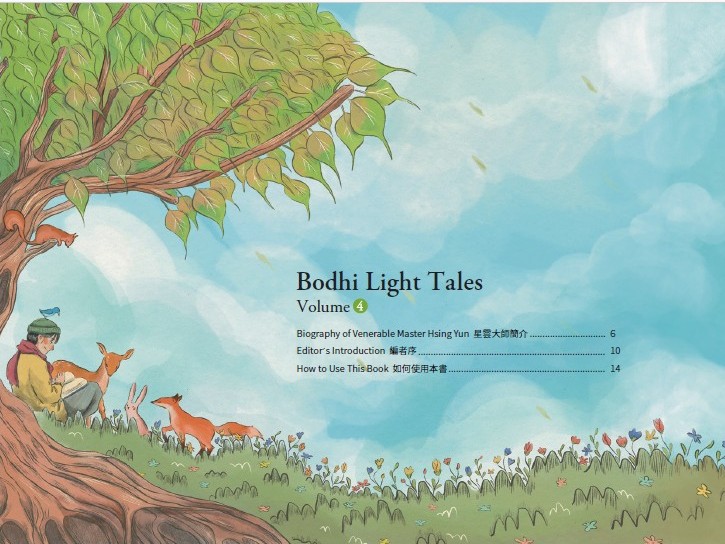
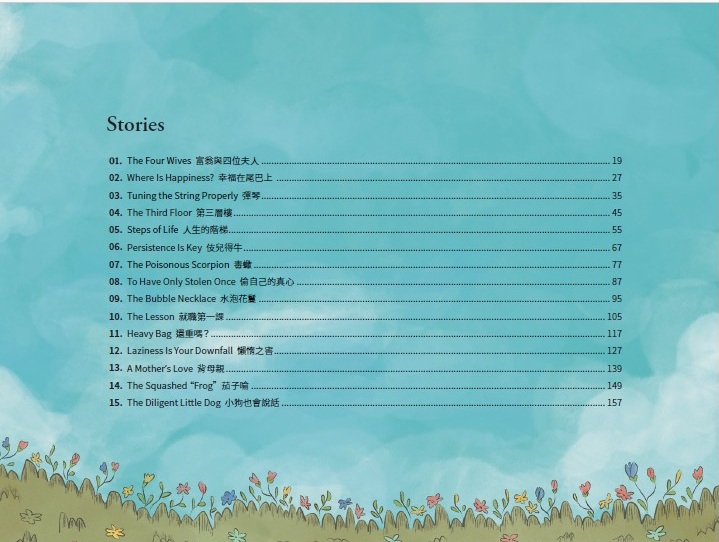
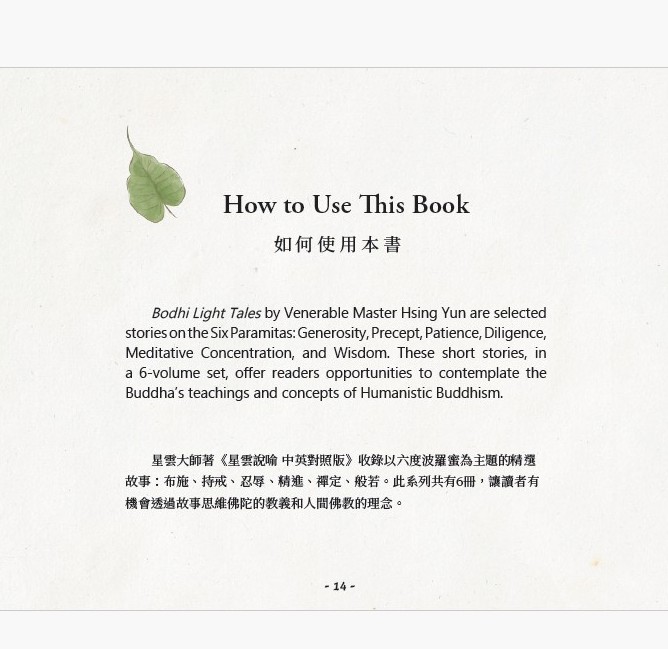
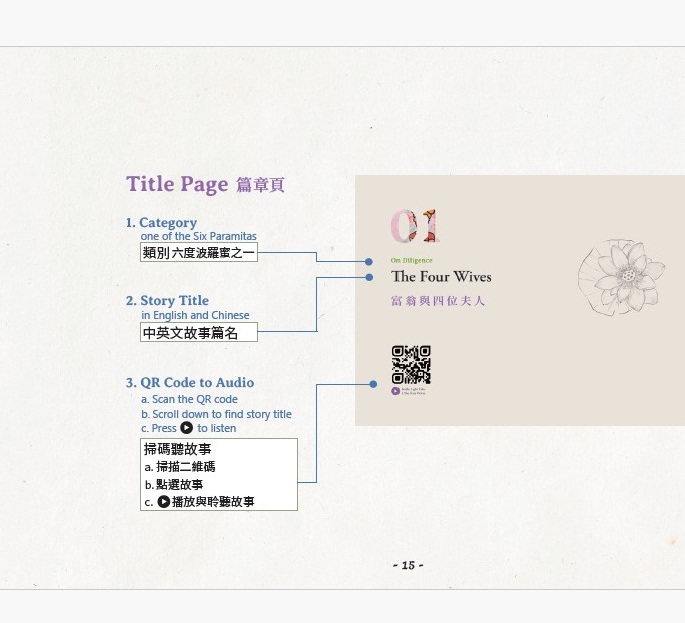
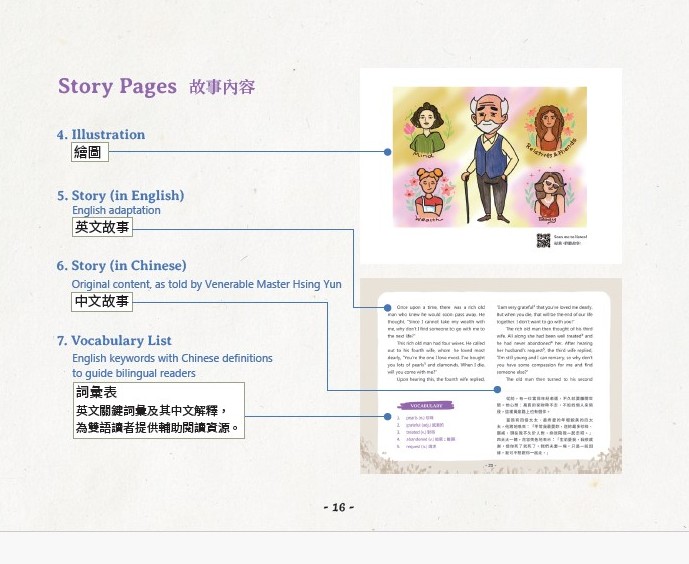
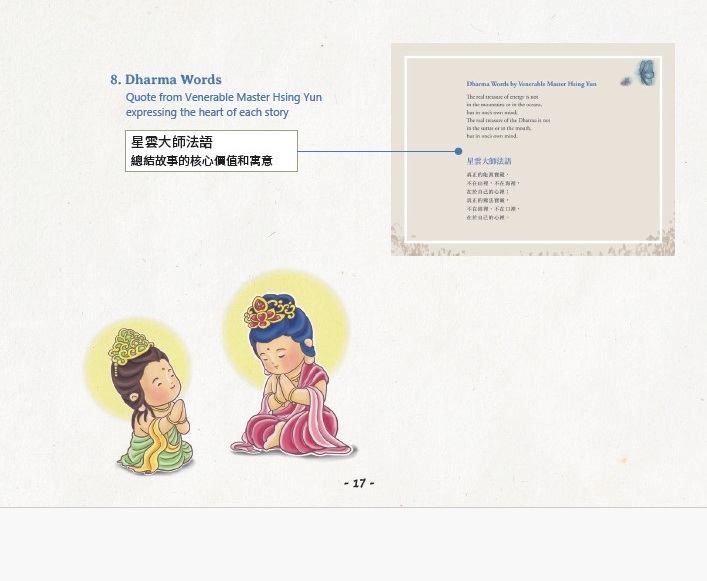
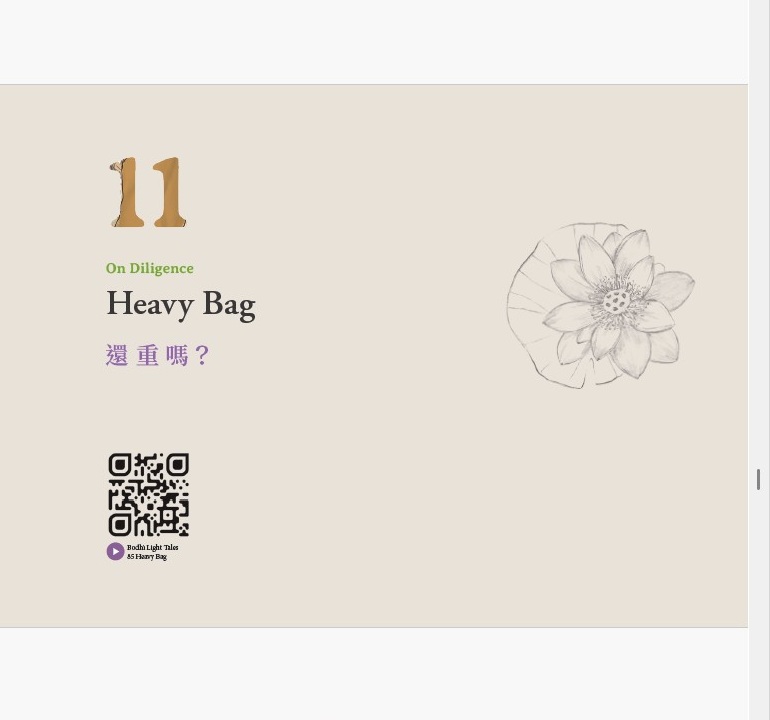
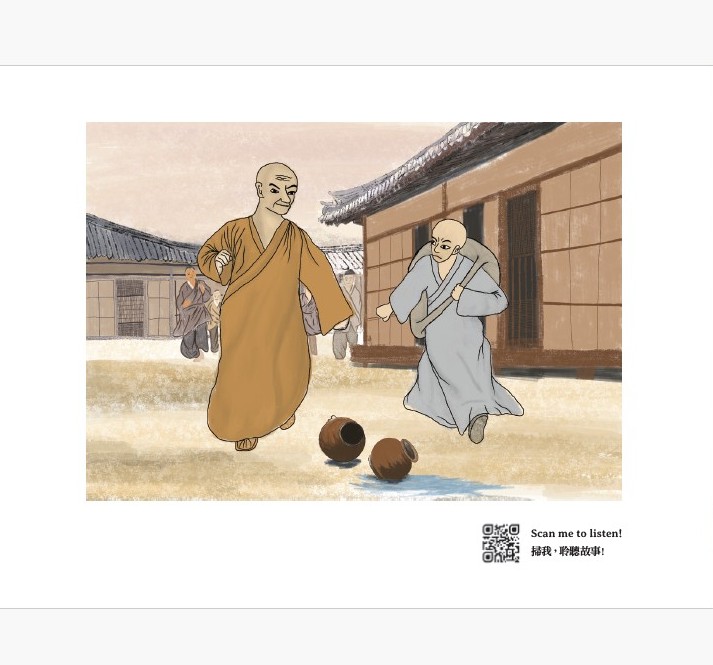
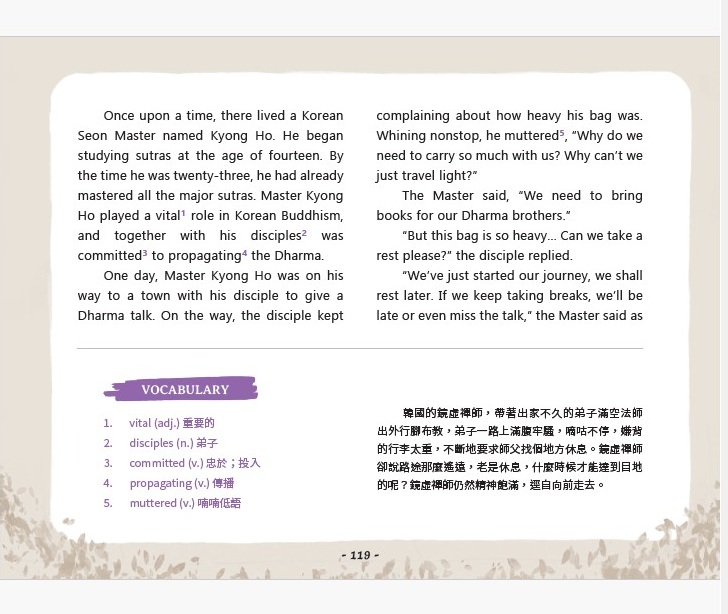
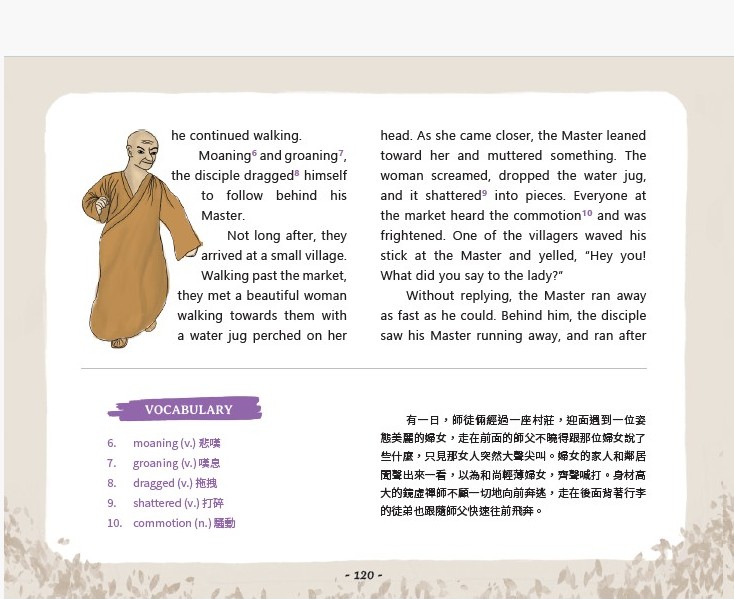
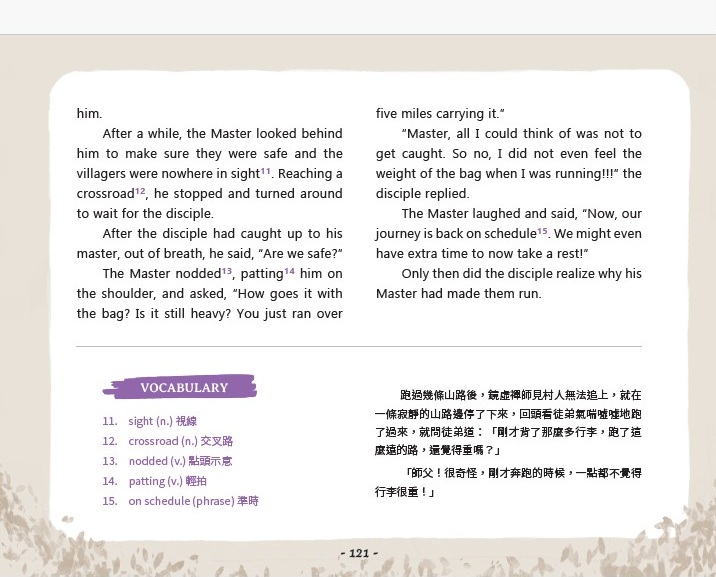
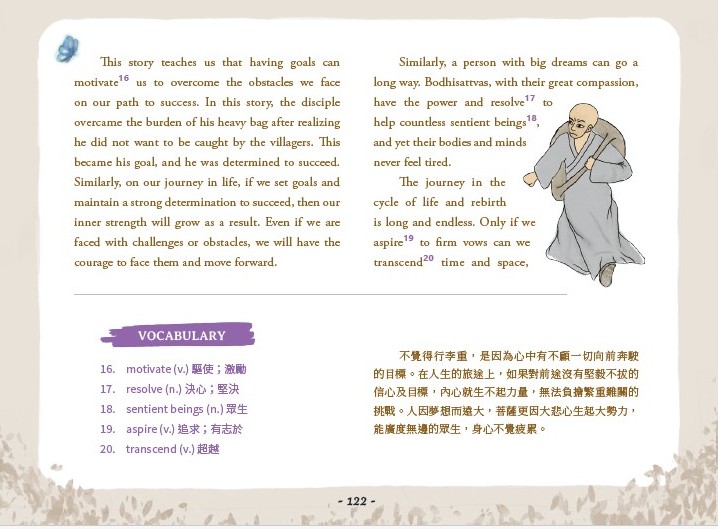
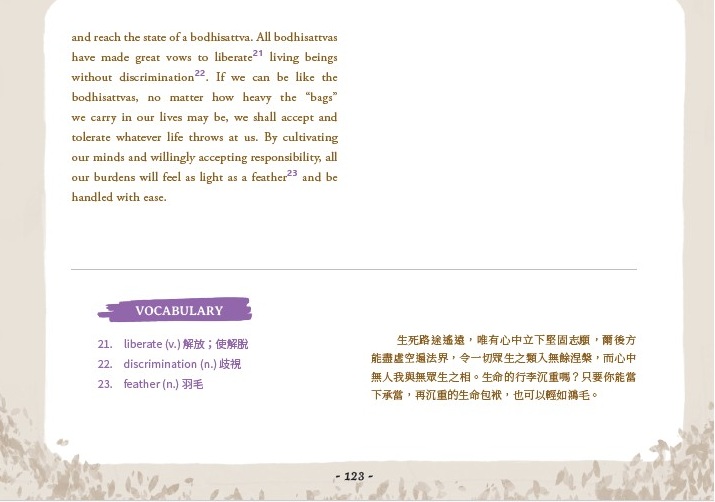
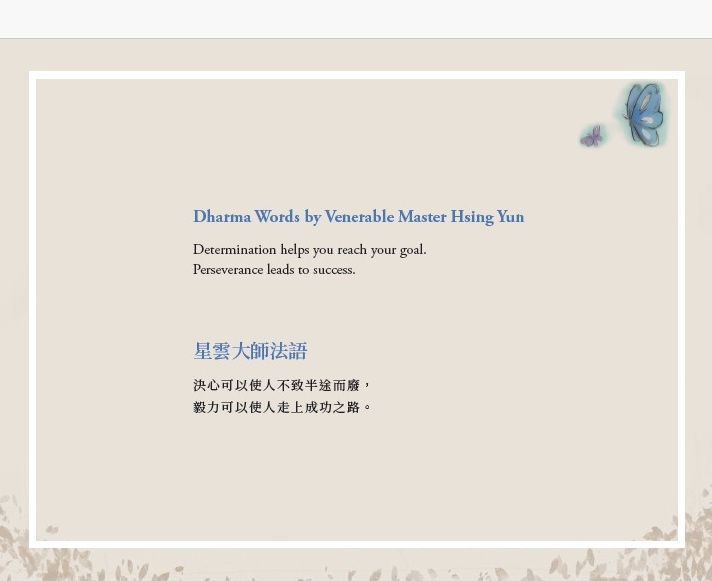

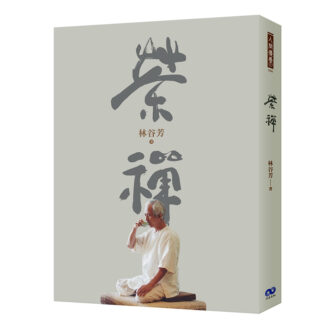
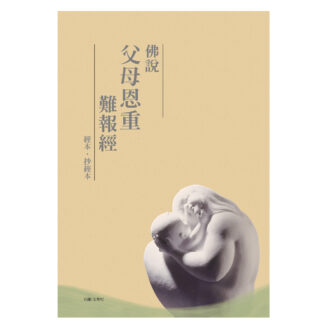

商品評價
目前沒有評價。